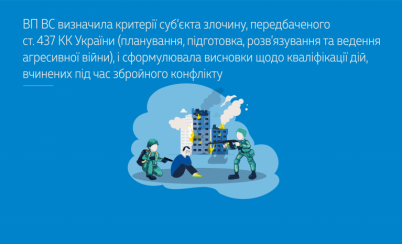Contact center of the Ukrainian Judiciary 044 207-35-46

The acts defined in Art. 437 of the CC can be committed by persons who, by virtue of their official authority or actual social position, are able to exercise effective control over or manage political or military actions and/or significantly influence political, military, economic, financial, informational and other processes in their own country or abroad, and/or manage specific areas of political or military actions.
Planning, preparation, initiation of an aggressive war or military conflict, participation in a conspiracy aimed at committing such actions, and conduct of an aggressive war or aggressive military actions require that the subject has the appropriate powers, resources in the areas of international relations, domestic policy, defense, industry, economy, finance, or such a social position that allows them to influence the decision-making of authorized persons.
This conclusion was reached by the Grand Chamber of the Supreme Court, having considered criminal proceedings on cassation appeals of the defense lawyers of two persons convicted of crimes under Article 437(2) of the Criminal Code of Ukraine (planning, preparation, initiation and conduct of an aggressive war); Art. 438(1) of the Criminal Code of Ukraine (violation of the laws and customs of war); Article 146(3) of the Criminal Code of Ukraine (illegal deprivation of liberty or abduction of a person); Article 260(2) of the Criminal Code of Ukraine (creation of paramilitary or armed groups not provided for by law) and Article 263(1) of the Criminal Code of Ukraine (illegal handling of weapons, ammunition or explosives).
As established by the courts of previous instances, in 2014, these individuals took part in the armed aggression of the Russian Federation against Ukraine as part of an armed formation not provided for by law, which was directly managed and controlled by unidentified officials of the armed forces of the aggressor country. Acting in prior coordination with these individuals and carrying out their clearly criminal orders, the convicts directly shelled the positions, destroyed manpower and military equipment of the Armed Forces of Ukraine, the National Guard of Ukraine, territorial defense units and other law enforcement agencies of Ukraine.
In addition, the convicts, as part of an organized criminal group, kidnapped six people with the use of weapons, illegally deprived them of their liberty and engaged them in military work; violated the laws and customs of war established by international law; illegally purchased, stored and carried firearms and ammunition.
The Grand Chamber of the Supreme Court noted that actions committed in the context of an armed conflict, which are covered by the prohibitions established by international humanitarian law and constitute a serious violation of them, are qualified only under Article 438 of the Criminal Code of Ukraine and do not require additional legal assessment under other articles of this Code.
Acts that, although committed during the armed conflict, are not covered by the prohibitions provided for by international humanitarian law, may be qualified under other articles of the Special Part of the Criminal Code of Ukraine.
The provisions of the Geneva Convention relative to the Protection of Civilian Persons in Time of War of August 12, 1949, are applicable to both members of the armed forces of the Russian Federation and members of illegal armed groups and representatives of the occupation administration acting on behalf of and/or in the interests of the occupying power. Failure of such persons to comply with the requirements of the Geneva Convention is a violation of the laws and customs of war.
In addition, the Grand Chamber of the Supreme Court pointed out that the norms of international law applicable to Ukraine and national legislation do not contain provisions that would provide for an official declaration of aggression by a particular state as a mandatory condition for qualifying the actions of persons involved in an armed conflict as war crimes. Therefore, the failure to recognize an act of aggression in accordance with the procedure established by the UN Charter does not prevent the conviction and punishment of perpetrators for a criminal offense under Article 438 of the Criminal Code of Ukraine.
The Grand Chamber of the Supreme Court also drew attention to the fact that Art. 438 of the Criminal Code of Ukraine establishes liability not for an act of aggression, but for violation of the laws and customs of war during an ongoing armed conflict, regardless of its legality or illegality as such. These laws and customs impose respective obligations, prohibitions and restrictions on all combatants - both members of regular armies and members of any other armed formations, regardless of their legal status and the presence or absence of a certain official position. After all, during the war, the threat to the life, health, safety, honor, dignity, freedom, and personal integrity of civilians in need of special legal protection is not caused by the formal powers of armed persons, but by the actual power they may have over the civilian population.
In view of the above, the Grand Chamber of the Supreme Court partially satisfied the cassation appeals of the convicts. Therefore, the respective persons were convicted under Part 1 of Article 438 and Part 2 of Article 260 of the Criminal Code of Ukraine. At the same time, the Grand Chamber of the Supreme Court overturned the decisions of the courts of previous instances in terms of convicting these persons under Part 2 of Article 27, Part 2 of Article 28, and Part 2 of Article 437 of the Criminal Code of Ukraine. In addition, the Grand Chamber of the Supreme Court excluded from the appealed court decisions the qualification of the convicts' actions under Part 3 of Art. 146 and Part 1 of Art. 263 of the Criminal Code of Ukraine as excessive.
The Resolution of the Grand Chamber of the Supreme Court of February 28, 2024 in case No. 415/2182/20 (proceedings No. 13-15кс22) - https://reyestr.court.gov.ua/Review/117555176.
This and other legal positions of the Supreme Court can be found in the Database of Legal Positions of the Supreme Court - https://lpd.court.gov.ua.